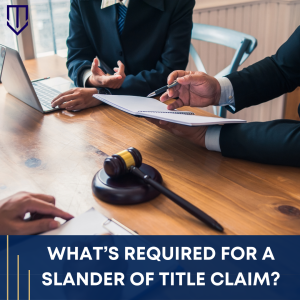 Slander of title is quite the unique cause of action. As the name implies, it involves defamatory or slanderous activity but not against any person or personal interest. Instead, a slander of title involves activity that calls the state of your title into doubt (by, for example, filing an unwarranted lis pendens) that diminishes the value of your property.
Slander of title is quite the unique cause of action. As the name implies, it involves defamatory or slanderous activity but not against any person or personal interest. Instead, a slander of title involves activity that calls the state of your title into doubt (by, for example, filing an unwarranted lis pendens) that diminishes the value of your property.
In these situations, parties have the ability to sue for slander of title. The suit is usually accompanied by an action to clear a cloud on the title or to quiet the title, but the gist of it is quite simple: compensation for the injurious activity to the state of one’s title.
 California Partition Law Blog
California Partition Law Blog


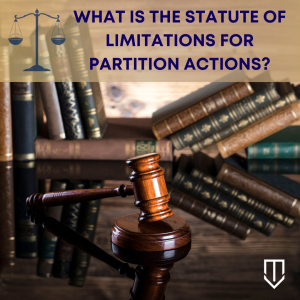 In most cases, no. Instead, the statute of limitations most frequently bars a partition action when a party’s rights to the property have lapsed due to an ouster.
In most cases, no. Instead, the statute of limitations most frequently bars a partition action when a party’s rights to the property have lapsed due to an ouster. 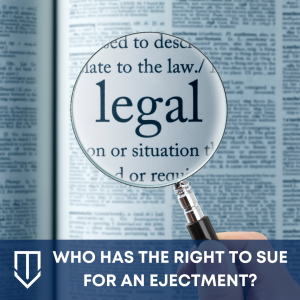 Ejectment is an action brought by a party seeking to recover a possessory interest or claim of title in a piece of real property. Typically, an ejectment action arises when a titleholder to a piece of property has been wrongfully excluded or withheld from the property. Therefore, ejectment applies only to those cases where an individual actually has possessory title to the subject property.
Ejectment is an action brought by a party seeking to recover a possessory interest or claim of title in a piece of real property. Typically, an ejectment action arises when a titleholder to a piece of property has been wrongfully excluded or withheld from the property. Therefore, ejectment applies only to those cases where an individual actually has possessory title to the subject property.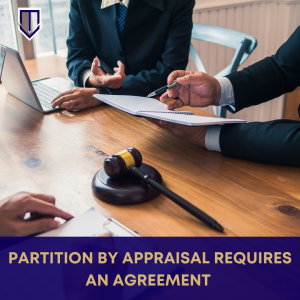 A partition by appraisal is an alternative method of partition that occurs when the parties to a
A partition by appraisal is an alternative method of partition that occurs when the parties to a  “Joint tenancy” is a phrase that most people associate with the co-ownership of a property. And indeed, this is correct. Joint tenancy is a form of co-ownership in California, second only to
“Joint tenancy” is a phrase that most people associate with the co-ownership of a property. And indeed, this is correct. Joint tenancy is a form of co-ownership in California, second only to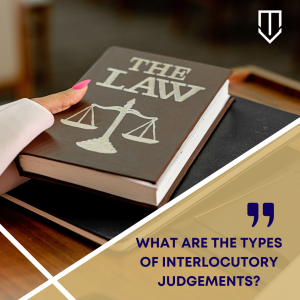 In California, in many
In California, in many  Even when a party finally secures a judgment of partition, the property itself must still be sold (or partitioned in another way). This raises a brand-new set of issues for litigants as they attempt to figure out the terms of sale, when the property should be sold, and, most importantly, the asking price.
Even when a party finally secures a judgment of partition, the property itself must still be sold (or partitioned in another way). This raises a brand-new set of issues for litigants as they attempt to figure out the terms of sale, when the property should be sold, and, most importantly, the asking price. In most breach of contract actions, the court must find that a valid contract has been created. There are several requirements that need to be fulfilled in order to have an enforceable contract. In certain circumstances, evidence of the existence of a contract in writing is required for the contract to be valid.
In most breach of contract actions, the court must find that a valid contract has been created. There are several requirements that need to be fulfilled in order to have an enforceable contract. In certain circumstances, evidence of the existence of a contract in writing is required for the contract to be valid. In California, business enterprises can take many forms (LLCs, corporations, partnerships, etc.). But perhaps the most unique is the “joint venture,” a special entity that, more often than not, is
In California, business enterprises can take many forms (LLCs, corporations, partnerships, etc.). But perhaps the most unique is the “joint venture,” a special entity that, more often than not, is  The deed to a property is the most important document a property owner has. It describes the title and its associated rights while operating as the conveyance of property itself. For that reason, the law presumes the validity of deeds without defects on their face. But that does not mean that every deed is legally valid and not subject to cancellation.
The deed to a property is the most important document a property owner has. It describes the title and its associated rights while operating as the conveyance of property itself. For that reason, the law presumes the validity of deeds without defects on their face. But that does not mean that every deed is legally valid and not subject to cancellation.